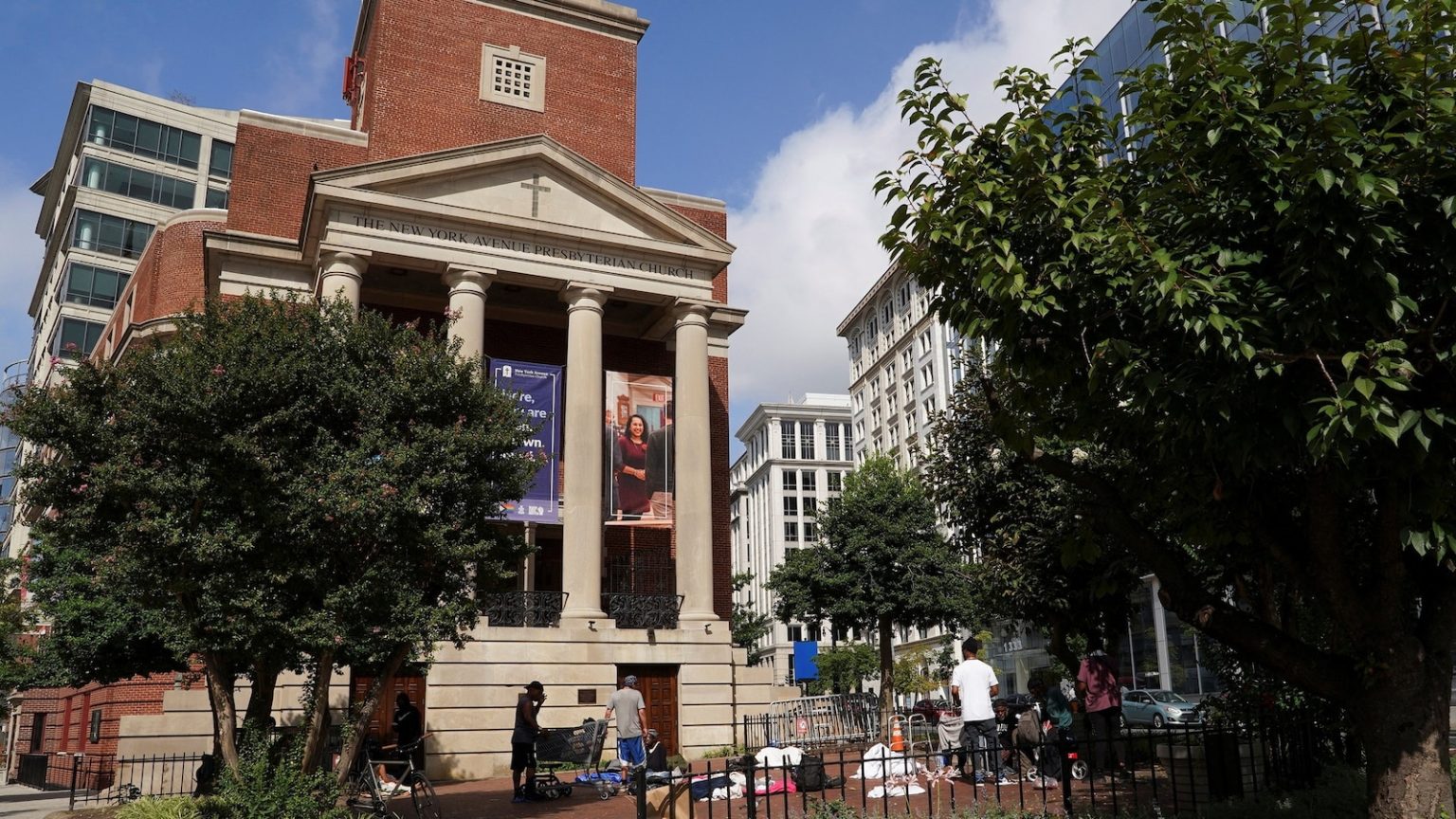President Donald Trump vowed this week to rid Washington, D.C., of homeless encampments, issuing a warning that the “homeless have to move out, IMMEDIATELY.” Though what those plans will look like, including where people will go, is unclear, sparking concerns among advocacy groups.
While previewing an announcement regarding D.C., Trump told those experiencing homelessness in a social media post on Sunday, “We will give you places to stay, but FAR from the Capital.”
In his remarks the following day, Trump said that the federal government will be “removing homeless encampments from all over our parks” in D.C. as part of an effort to “rescue our nation’s capital from crime, bloodshed, bedlam and squalor and worse.”
“There are many places that they can go, and we’re going to help them as much as you can help. But they’ll not be allowed to turn our capital into a wasteland for the world to see,” Trump said during a press briefing on Monday while announcing plans for the federal government to take over the D.C. police department and deploy National Guard troops in D.C.
A general view of a homeless encampment outside the New York Avenue Presbyterian Church in Washington, D.C., U.S., Aug. 11, 2025.
Ken Cedeno/Reuters
Dismantling homeless encampments is not a new practice in D.C. for either the Trump administration or local government, Dana White, the advocacy director for Miriam’s Kitchen, a nonprofit focused on ending chronic homelessness in D.C., told ABC News.
“What is particularly startling is the vague language about removing them from the district altogether, without any details about where they would go, who would transport them, how that’s funded, what that means for their human and civil rights,” White said of Trump’s recent remarks.
Donald Whitehead Jr., executive director of the D.C.-based National Coalition for the Homeless, said that though Trump mentioned homelessness during Monday’s press conference several times, there was “no concrete information about how to address the issue,” such as resources that would be developed to address the issue in a non-punitive matter, or where people will be moved.
“Our question is, is this the same solution that we’ve seen with the immigration population? Are people just going to be moved to remote destinations?” he said.
“Really, for a homeless advocate, it was really an information-less press conference,” Whitehead said. “It points to it being more of a stunt than an actual conference about solutions to homelessness.”
President Donald Trump speaks with reporters in the James Brady Press Briefing Room at the White House, Aug. 11, 2025, in Washington.
Alex Brandon/AP
The two executive orders issued Monday, which were the focus of Trump’s press briefing, did not specifically mention homelessness.
D.C. Mayor Muriel Bowser told reporters Monday that her office has not gotten any more details from the White House but will be following up with Attorney General Pam Bondi.
“We really haven’t gotten any more detail about the plan, about the words that he said,” she said during a press briefing Monday afternoon when asked about Trump’s remarks on homelessness. “It wasn’t referenced in the executive order that came down.”
“I believe he had a previous executive order that also identified Attorney General Bondi as a point of contact as it relates to homelessness and such, so we’ll follow up with her,” Bowser continued.
A general view of a homeless encampment near the Kennedy Center in Washington, D.C., Aug. 11, 2025.
Ken Cedeno/Reuters
On any given night in D.C., there are 798 unhoused people on the street, according to the Community Partnership, a nonprofit working to prevent homelessness in D.C.
In March, Trump issued an executive order for the removal of homeless encampments on federal land within D.C. Since then, the U.S. Park Police have removed over 70 homeless camps, Interior Secretary Doug Burgum said Monday.
Last month, Trump also signed an executive order seeking to make it easier for cities and states to remove homeless people from the streets and into treatment centers by reversing judicial precedents and ending consent decrees. It also looks to redirect federal funds toward programs that tackle substance abuse and targets “housing first” policies, which prioritize permanent housing as the first step in addressing homelessness.
The orders have been met with pushback from homeless advocates, who contend that permanent, affordable housing with supportive services is a proven solution for chronically homeless people, and that dismantling homeless encampments is a counterproductive strategy to resolving homelessness.
“When we clear encampments, we disconnect people from the services they need to survive and to start the process of being housed, and often disconnects them from their belongings and from the communities that they formed in encampments,” White said.
People protest President Donald Trump’s decision to federalize the DC police force, as well as to deploy 800 National Guard members, in Washington, August 11, 2025.
Jim Lo Scalzo/eEPA/Shutterstock
Without affordable housing, people will most likely pop up in a new camp, he and Whitehead said.
“They’re basically moved from one site to another because there’s not enough shelter beds to meet the needs of the population in D.C.,” Whitehead said. “They don’t have a place to go. There isn’t enough shelter. There certainly isn’t enough housing.”
According to D.C.’s most recent census of people experiencing homelessness, released in May, there was an overall 9% decrease in homelessness in 2025 from the previous year, including an 18.1% decrease among families and a 4.5% decrease among single individuals.
White said Miriam’s Kitchen is working to make sure that single adults experiencing chronic homelessness are prioritized in funding and policy.
“It’s certainly a more tense environment, because folks who are unhoused and housing advocates alike don’t really know what to expect from this administration,” he said. “We’re just going to try to continue to provide our services as usual and prepare to respond rapidly as needed.”



